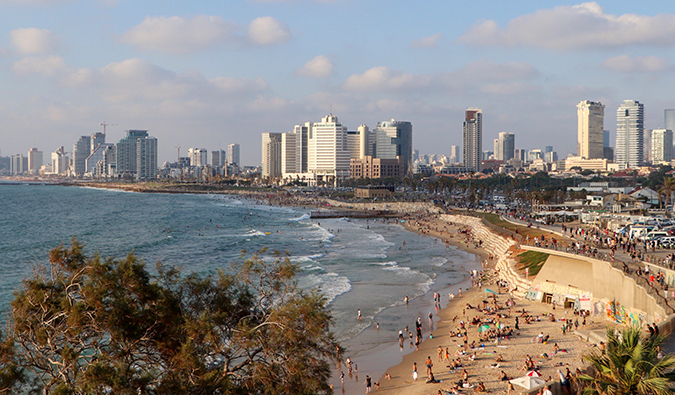
Posted: 7/22/2019 | July 22nd, 2019
This guest post from Anastasia Schmalz and Tomer Arwas of Generation Nomads. They have spent an extensive amount of time traveling Israel and today are going to share their knowledge to help you road trip around Israel on a budget!
Having visited Israel regularly and completed three road trips across the country, we can confidently say that there is no better way to explore it than in your own car.
The road infrastructure is well maintained throughout the country, and distances between destinations are short. You can start your day floating in the Dead Sea, the lowest point on earth, and watch the sunset a couple of hours later from the porch of your wooden cabin in the Golan Heights or on a Mediterranean beach.
Additionally, having your own vehicle means that you can visit places off the beaten path that buses and trains don’t reach. For example, on our route from Masada to Tel Aviv, we took a spontaneous detour to visit a traditional Bedouin desert village, which wouldn’t have been possible if we didn’t have a rental car.
Over the years, we have built up know-how and resources that help us to make our road trips a smooth and wallet-friendly experience.
Budgeting: What will your daily costs be like?
Israel has become one of the most expensive tourist destinations in the world in recent years and, according to the Israeli newspaper Haaretz, the cost of a visit can exceed expensive cities such as Zurich, Paris, London, and Moscow. Here are some average costs:
Accommodations (per night):
- Hostel: 85 NIS ($24 USD) per bed in a 4-bed dorm room
- Hotel: 300 NIS ($83 USD) per room
- Airbnb: 300 NIS ($83 USD) per room or for the entire place
Food:
- Main course on the menu of a restaurant: 60 NIS ($17 USD)
- Street food meal (e.g., falafel or shawarma sandwich, with a drink): 25 NIS ($7 USD)
Car rental:
- Rental: 80-140 NIS ($22-39 USD) per day
- Gas: Although prices vary, expect to spend 6–7 NIS ($1.67–1.95 USD) per liter of gasoline
How to Rent a Car in Israel
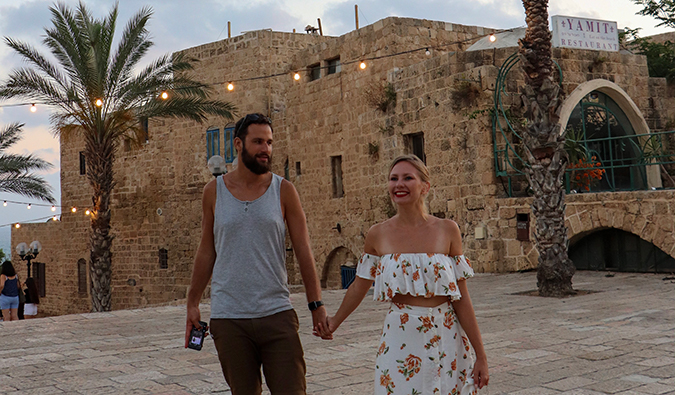
As you’re planning to explore the country in your own wheels, renting a car at the airport might seem like the most logical step to take. However, if you plan to spend a couple of days in Tel Aviv first, we advise renting the car later, in the city center. The reason is that by picking up and returning the car at the airport, the rental price will be subject to an additional tax. Furthermore, you will avoid the headache of parking in Tel Aviv, where finding a parking spot feels like being Tom Cruise in Mission: Impossible.
There are many car rental agencies in Tel Aviv that can help arrange your rental, or you can select the pickup location online if you decide to reserve a car before your trip. We recommend comparing prices on sunnycars.com, or calling or walking up to brokers directly. Rental fees are dependent on the seasons and typically start around 80 NIS ($22 USD) per day.
There are plenty of options for renting your car in the city center. Most rental companies are located on HaYarkon Street near the Dan Tel Aviv Hotel, where you can walk from one to another to do some price comparison before choosing the one that suits you best.
There are several smaller car rental agencies that have more attractive prices than the large players. We have frequently rented cars from those companies without any issues.
These are some of our recommended rental agencies:
- Auto Shay, HaYarkon St 130, Tel Aviv-Yafo
- TIR, HaYarkon St 132, Tel Aviv-Yafo
- Eldan, Kaufmann St 10, Tel Aviv-Yafo
- Hertz, HaYarkon St 144, Tel Aviv-Yafo
- Shlomo Sixt, HaYarkon St 122, Tel Aviv-Yafo
- Europcar, HaYarkon St 80, Tel Aviv-Yafo
When comparing deals, be sure to take into account the type of insurance policy as well as the number of kilometers included; for the itinerary suggested below, you can expect to log a total of 850 to 1,000 kilometers. Also, check ahead if your driver’s license is valid in Israel by calling a rental agency and verifying the requirements directly with them.
Driving Safety Tips for Israel
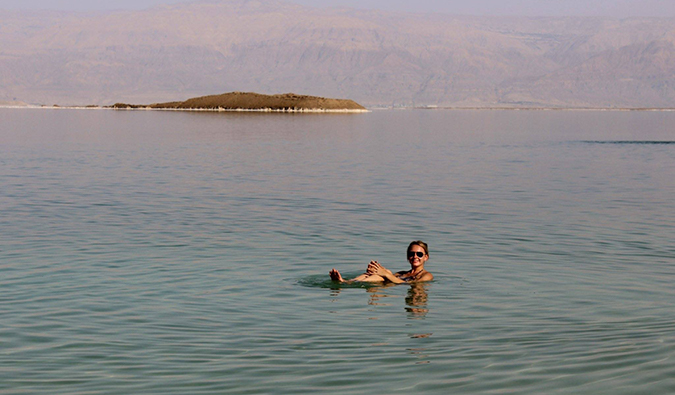
Driving in Israel is generally safe and comfortable. The road infrastructure is in good condition, with good signage. Nonetheless, Israeli drivers tend to be impatient and pushy, which should be taken into account if you are not used to driving under these conditions.
One important factor to consider in the planning of your trip is driving (or not driving) in the Palestinian territories, consisting of the West Bank and Gaza. There are set regulations to adhere to when entering the area. You will have to pass through army checkpoints on your way in and out and elaborate on the reasons why you wish to drive through. Moreover, do not rely on your GPS as may not work properly. Although the West Bank is now considered to be relatively safe, you should check with local authorities and your own country’s travel warnings for the latest travel advice.
Our Suggested Driving Route
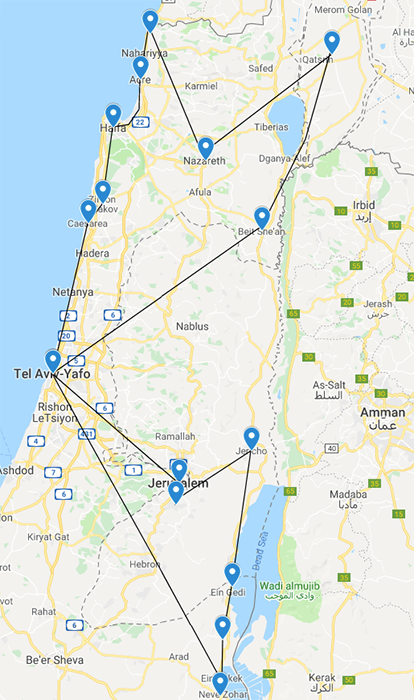
Start: Tel Aviv-Yafo —> Jerusalem —> Bethlehem —> Jericho —> Ein Gedi Nature Reserve —> Masada —>Dead Sea —> Tel Aviv —> Caesarea —> Zichron Ya’akov —> Haifa —> Acre —> Rosh Hanikra —> Galilee —> Golan Heights —> Beit She’an —> Tel Aviv-Yafo
How to Navigate Around Israel
Car rentals usually charge an extra fee for renting a GPS system. To save money, get an Israeli SIM card instead. For 50 NIS ($14 USD), you can get a two-week unlimited data package from local provider Partner. This also allows you to stay connected with family and friends, check out restaurant reviews, and keep your Insta story going.
With internet on your smartphone, there are several helpful apps you can use to navigate Israel during your road trip. iPhone’s built-in Maps app and Google Maps work quite well, but when in Rome, do as the Romans do: Waze is Israel’s most popular navigation app, as well as a social platform that monitors traffic and connects drivers on the road. The advantage of Waze is that it’s based on the most accurate traffic monitoring system in Israel and will always find you a best alternative route to skip traffic jams or inform you about speed cameras.
How to Park Your Car in Israel
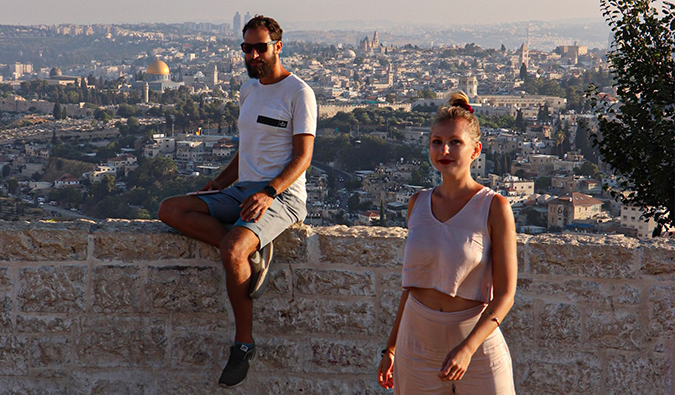
In major cities like Tel Aviv, Jerusalem, or Haifa, parking can be problematic. Finding a parking spot might require cruising around for 20 or even 30 minutes. When booking an accommodation in one of those cities, try to inquire whether they offer on-site parking. This will save you time and frustration.
If you do find street parking, make sure to comply with the rules. The curb of the streets is marked with the following color codes:
- Blue + white = Paid parking
- Red + white = No parking allowed
- Solid gray = Free parking
- Gray + yellow = Kiss and drive (you may not leave the car)
Another option in major cities is parking lots. They are more expensive and may charge a fixed price for the full day or by the hour.
Good news: On Shabbat (Friday sunset to Saturday sunset) parking is free of charge everywhere.
Here are some apps you can use to navigate your way around cities:
- Moovit – This is the locals’ app for checking real-time bus arrival information and planning trips.
- Google Maps – It is getting more accurate in recent years and can also be used to check real-time bus arrivals.
- GetTaxi – The Israeli version of Uber, it’s a taxi-booking app that allows you to pay with a credit card.
- Uber – Uber made its appearance in Israel several years ago and is becoming more popular.
2 Final Tips on Driving Around Israel
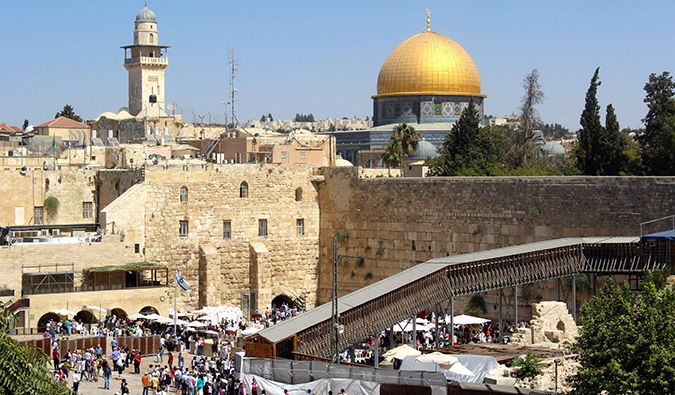
First, the best time of year for a road trip around Israel is during spring (April-June) and autumn (September-October), when weather is most pleasant. Unfortunately, the good weather also means that these the busiest months. Additionally, these are also the months with the most Jewish holidays, which are the busiest and most expensive times to visit (see below for more info). Winter months are rather unpredictable, and you won’t be guaranteed beach time, unless you had down south to Eilat. July and August are the hottest months of the year — even locals don’t spend much time outdoors, instead going from one air-conditioned space to another. Although rental cars are equipped with A/C, the heat and humidity can become unbearable during those months, and sightseeing can seem like a chore.
Second, Shabbat is the Jewish holy day of the week, from sunset Friday to sunset Saturday, and, besides weekly Shabbat, there are also many Jewish, Christian, and Muslim holidays throughout the year.
So how will these affect your trip?
First, Jewish holidays (many of which fall in the spring and autumn) are usually busy periods in Israel, and prices of accommodations and car rentals rise. Second, Israel is a Jewish state, meaning that during Shabbat and other holidays, many businesses (besides non-kosher restaurants) are closed. This may include some car rental companies, as well as shops, grocery stores, and museums. This is especially true in more religious cities and towns, such as Jerusalem. On Yom Kippur, Judaism’s most somber holiday, it is forbidden to drive. Moreover, there are observant Jewish neighborhoods where driving on Shabbat is unwelcome and even dangerous, such as Jewish Ultra Orthodox neighborhood in Jerusalem: Mea She’arim.
Lastly, Christian holidays such as Christmas and Easter attract many tourists and pilgrims to holy sites such as Jerusalem, Nazareth, and Bethlehem. Muslim holidays are not officially part of the national holiday calendar, but are still celebrated by the large Muslim population residing in Israel. Muslims observe Friday as the holy day of the week, meaning that Muslims sites and businesses are closed.
***
Having done three cross-country road trips over the last two years, our experience is that there is hardly any better way to explore Israel than in your own car! A well-maintained road infrastructure and short distances between (most) destinations make Israel a road trip–friendly country.
Planning your trip outside of the main Jewish holidays, renting your car from less expensive agencies, and using useful apps for navigating and parking in cities will give you the smoothest experience possible while helping you to save money.
Anastasia Schmalz and Tomer Arwas are travel coaches with the mission of helping millennials realize the life-transforming benefits of travel by designing a trip to be the journey towards a fulfilling lifestyle. In their blog generationnomads.com they write about topics related to the nomadic lifestyle, share pre-reads of their upcoming book, and offer guidance to travellers on how to make the most out of their travel. In their Friday newsletter and Instagram (@generationnomads) they offer free giveaways of their coaching tools & techniques.
Book Your Trip to Israel: Logistical Tips and Tricks
Book Your Flight
Find a cheap flight by using Skyscanner or Momondo. They are my two favorite search engines because they search websites and airlines around the globe so you always know no stone is left unturned.
Book Your Accommodation
You can book your hostel with Hostelworld. If you want to stay somewhere other than a hostel, use Booking.com as they consistently return the cheapest rates for guesthouses and cheap hotels. I use them all the time.
Don’t Forget Travel Insurance
Travel insurance will protect you against illness, injury, theft, and cancellations. It’s comprehensive protection in case anything goes wrong. I never go on a trip without it as I’ve had to use it many times in the past. I’ve been using World Nomads for ten years. My favorite companies that offer the best service and value are:
Looking for the best companies to save money with?
Check out my resource page for the best companies to use when you travel! I list all the ones I use to save money when I travel – and I think will help you too!
The post How to Road Trip Around Israel Like a Pro appeared first on Nomadic Matt's Travel Site.
 Posted: 11/23/2019 | November 23rd, 2019
Compared to many of its neighbors in the Middle East, Jordan is an exceptionally safe country to visit.
When I was in Jordan, I never encountered any safety issues. And few people gave me that “what are you doing here?” look. Instead, I found everyone to be happy, curious, and welcoming.
And a number of solo female travelers I know have experienced the same thing.
In short, while people may have some trepidation about the region, Jordan is one of the safest places to visit in the region, and likely little will go wrong here. In fact, the Jordanian government puts a lot of effort and money into making visitors feel safe through high-profile security and police presence in tourist regions and in hotels.
So what do you need to think about before you head to Jordan? And are there any parts you should avoid?
The tips below cover the safety issues you will need to consider before you travel to Jordan so you can enjoy every moment of your trip. If you keep these tips in mind, you’ll be very safe while in Jordan!
1. Be aware of your belongings – Thanks to an increased police presence in Jordan, even petty crime rates are pretty low, but it’s always sensible to stay aware of where your belongings are. There have been reports of pickpockets and purse-snatchers in some of the more crowded parts of Amman’s old town center and at major tourist sites.
2. Avoid the borders with Syria and Iraq – It’s common knowledge that Syria and Iraq are unsafe places to visit at the moment, and this extends to their frontiers with Jordan. None of the main tourist attractions are near these borders, so it makes sense just to keep clear.
3. Stay away from public protests – It seems that the regular public demonstrations in Jordan are nearly always peaceful, but just the same, it is common sense to avoid big gatherings like this if you can help it.
In the capital, Amman, there are often demonstrations on Thursday evenings or after Friday midday prayers, near the office of the prime minister. They also tend to occur when major economic issues are being debated or on significant anniversaries. Keep an eye on the local media so you’re able to avoid accidentally being caught up in any local protests.
4. Be aware of your safety in taxi rides – There have been a few reports from female travelers about harassment from taxi drivers. The best way to avoid this is to sit in the back and remain alert. These are very isolated incidents; generally speaking, taxi drivers in Jordan are really helpful.
5. Be careful on the Desert Highway – Highway 15, which runs north to south through Jordan, is one of the main routes between Amman and other centers, like Aqaba. There have been occasions when the highway is closed because of unrest in Ma’an in the south, and other parts are blocked from time to time. Check the local news for any closures and always follow police instructions.
6. Buy travel insurance – Whenever and wherever you travel, you should always have an appropriate level of travel insurance, since you never know when something can go wrong. Buy travel insurance when you book your trip to help you out of an emergency or to compensate you for theft or injury. I never leave home without it.
Posted: 11/23/2019 | November 23rd, 2019
Compared to many of its neighbors in the Middle East, Jordan is an exceptionally safe country to visit.
When I was in Jordan, I never encountered any safety issues. And few people gave me that “what are you doing here?” look. Instead, I found everyone to be happy, curious, and welcoming.
And a number of solo female travelers I know have experienced the same thing.
In short, while people may have some trepidation about the region, Jordan is one of the safest places to visit in the region, and likely little will go wrong here. In fact, the Jordanian government puts a lot of effort and money into making visitors feel safe through high-profile security and police presence in tourist regions and in hotels.
So what do you need to think about before you head to Jordan? And are there any parts you should avoid?
The tips below cover the safety issues you will need to consider before you travel to Jordan so you can enjoy every moment of your trip. If you keep these tips in mind, you’ll be very safe while in Jordan!
1. Be aware of your belongings – Thanks to an increased police presence in Jordan, even petty crime rates are pretty low, but it’s always sensible to stay aware of where your belongings are. There have been reports of pickpockets and purse-snatchers in some of the more crowded parts of Amman’s old town center and at major tourist sites.
2. Avoid the borders with Syria and Iraq – It’s common knowledge that Syria and Iraq are unsafe places to visit at the moment, and this extends to their frontiers with Jordan. None of the main tourist attractions are near these borders, so it makes sense just to keep clear.
3. Stay away from public protests – It seems that the regular public demonstrations in Jordan are nearly always peaceful, but just the same, it is common sense to avoid big gatherings like this if you can help it.
In the capital, Amman, there are often demonstrations on Thursday evenings or after Friday midday prayers, near the office of the prime minister. They also tend to occur when major economic issues are being debated or on significant anniversaries. Keep an eye on the local media so you’re able to avoid accidentally being caught up in any local protests.
4. Be aware of your safety in taxi rides – There have been a few reports from female travelers about harassment from taxi drivers. The best way to avoid this is to sit in the back and remain alert. These are very isolated incidents; generally speaking, taxi drivers in Jordan are really helpful.
5. Be careful on the Desert Highway – Highway 15, which runs north to south through Jordan, is one of the main routes between Amman and other centers, like Aqaba. There have been occasions when the highway is closed because of unrest in Ma’an in the south, and other parts are blocked from time to time. Check the local news for any closures and always follow police instructions.
6. Buy travel insurance – Whenever and wherever you travel, you should always have an appropriate level of travel insurance, since you never know when something can go wrong. Buy travel insurance when you book your trip to help you out of an emergency or to compensate you for theft or injury. I never leave home without it.





